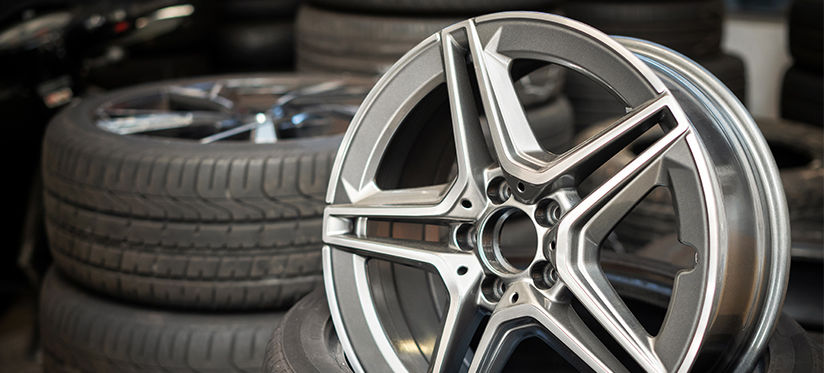
When it comes to selecting the right wheels for your vehicle, the choice between steel and alloy wheels is a crucial decision that can impact not just the aesthetics but also the performance, handling, and maintenance of your car. Both steel and alloy wheels have their unique set of characteristics, advantages, and considerations. In this guide, we'll delve into the key differences between steel and alloy wheels to help you make an informed choice based on your driving needs, preferences, and budget.
Understanding Steel Wheels
What are Steel Wheels?
Steel wheels are the traditional standard for most vehicles, known for their durability, strength, and affordability. These wheels are made from steel alloy, typically iron mixed with other metals, and are often found on entry-level or budget-friendly vehicles.
Features of Steel Wheels
Robust Construction: Steel wheels are sturdy and resistant to bending or cracking, making them ideal for rough road conditions.
Affordability: They are generally more budget-friendly compared to alloy wheels, making them a cost-effective option for vehicle owners.
Simple Design: Steel wheels often have a simple, utilitarian design without intricate patterns or finishes.
Weight: Steel wheels are heavier than alloy wheels due to their construction, which can affect fuel efficiency and handling.
Advantages of Steel Wheels
Durability:
Steel wheels are highly durable and resistant to impacts, making them suitable for heavy-duty use.
Affordability:
They are a budget-friendly option for those looking for reliable wheels without breaking the bank.
Easier to Repair:
Steel wheels are easier to repair and can often be straightened out if bent.
Winter Performance:
Some drivers prefer steel wheels for winter driving as they are less susceptible to damage from road salt and debris.
Exploring Alloy Wheels
What are Alloy Wheels?
Alloy wheels, on the other hand, are made from a blend of lightweight metals such as aluminum, magnesium, or a combination of both. These wheels are known for their sleek, stylish designs, enhanced performance, and premium look.
Features of Alloy Wheels
Lightweight Construction: Alloy wheels are significantly lighter than steel wheels, reducing unsprung weight and improving handling and fuel efficiency.
Aesthetic Appeal: They come in a wide range of designs, finishes, and colors, allowing for customization and a personalized look for your vehicle.
Heat Dissipation: Alloy wheels dissipate heat better than steel, which can improve braking performance and reduce the risk of brake fade.
Corrosion Resistance: Many alloy wheels are treated with coatings or finishes that offer superior resistance to rust and corrosion.
Advantages of Alloy Wheels
Improved Performance:
The lightweight construction of alloy wheels enhances handling, steering response, and overall performance.
Aesthetic Customization:
Alloy wheels offer a wide range of designs and finishes, allowing for a personalized and stylish look for your vehicle.
Heat Dissipation:
They dissipate heat more effectively than steel wheels, which can improve braking performance and reduce the risk of overheating.
Corrosion Resistance:
Many alloy wheels are treated with coatings or finishes that offer superior resistance to rust and corrosion, prolonging their lifespan.
Comparing Steel and Alloy Wheels
1. Weight:
Steel Wheels: Heavier than alloy wheels, which can affect fuel efficiency and handling.
Alloy Wheels: Lightweight construction improves handling, steering response, and fuel efficiency.
2. Aesthetic Appeal:
Steel Wheels: Typically have a simpler, utilitarian design without intricate patterns or finishes.
Alloy Wheels: Offer a wide range of designs, finishes, and colors for a personalized and stylish look.
3. Performance:
Steel Wheels: Known for durability and strength, suitable for heavy-duty use.
Alloy Wheels: Enhance handling, steering response, and overall performance due to lightweight construction.
4. Cost:
Steel Wheels: Generally more budget-friendly compared to alloy wheels.
Alloy Wheels: Higher initial cost due to premium materials and manufacturing processes.
5. Maintenance:
Steel Wheels: Easier to repair and can often be straightened out if bent.
Alloy Wheels: Require special care to prevent damage and maintain their finish.
Which Should You Choose?
Choose Steel Wheels if:
You prioritize durability and strength, ideal for heavy-duty use and rough road conditions.
You are on a budget and looking for a cost-effective option for reliable wheels.
You prefer a simpler, utilitarian design without the need for customization.
Choose Alloy Wheels if:
You seek improved performance, handling, and steering response for a more dynamic driving experience.
Aesthetic customization and a personalized look for your vehicle are important to you.
You are willing to invest in premium wheels that enhance the overall appearance and value of your car.
Read Also: Choosing The Right Tyre
Concluding This
Steel wheels and alloy wheels each have their own unique set of characteristics, advantages, and considerations. Steel wheels offer durability, affordability, and ease of repair, making them a practical choice for heavy-duty use and budget-conscious drivers. On the other hand, alloy wheels provide lightweight construction, enhanced performance, and aesthetic customization, ideal for those seeking improved handling and a stylish look for their vehicle.
When choosing between steel and alloy wheels, consider your driving needs, budget, aesthetic preferences, and the performance enhancements you desire. Whether you opt for the rugged durability of steel wheels or the sleek performance of alloy wheels, both options offer reliable and efficient wheel solutions for your vehicle. Select wisely, and enjoy the enhanced driving experience that suits your style and needs on the road ahead.

